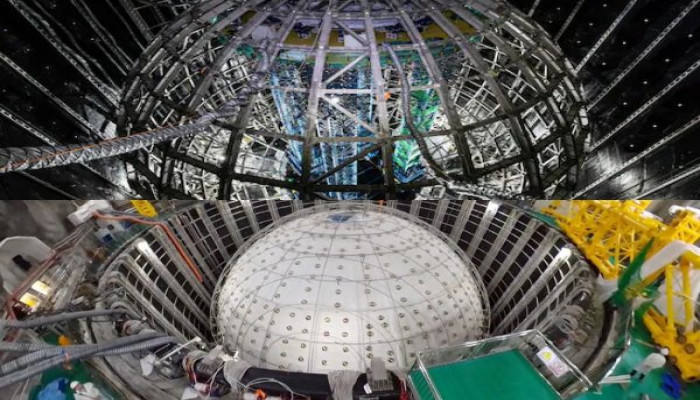China unveils world’s most powerful ghost particle detector
- In Reports
- 08:10 PM, Aug 27, 2025
- Myind Staff
China has formally opened operations at the Jiangmen Underground Neutrino Observatory (JUNO), now the world's most powerful and sophisticated neutrino detector facility, tiny and hard-to-catch particles commonly referred to as "ghost particles", reports. The South China Morning Post and NDTV. The Guangdong-based observatory has started taking data to enable scientists to learn more about these enigmatic particles, which have no electric charge, near zero mass, and move at speeds close to the speed of light.
Constructed 700 metres beneath the ground, JUNO has a 35 metre diameter acrylic sphere loaded with 20,000 tonnes of liquid scintillator, covered by a 44 metre deep water pool. The facility has been constructed in order to detect and research neutrinos generated by nuclear reactors of Taishan and Yangjiang, which are located approximately 53 kilometres away, according to the news portal.
The observatory is overseen by the Chinese Academy of Sciences' Institute of High Energy Physics. Wang Yifang, a particle physicist and JUNO spokesperson, referred to the opening and start of the detector as a "historic milestone" for international science research. Proposed in 2008, the global collaboration will make history with new discoveries regarding the mass and behavior of neutrinos.
"Completing the filling of the JUNO detector and beginning data taking represent a historic milestone. For the first time, we have commissioned a detector of this scale and accuracy for neutrinos. JUNO will enable us to provide some basic answers about the nature of matter and the universe," Wang Yifang, spokesperson for JUNO and scientist at the Institute of High Energy Physics (IHEP) of the Chinese Academy of Sciences (CAS), said to Chinese news agency Xinhua.
Since neutrinos interact only very infrequently with regular matter, they are able to travel through human bodies, buildings, or even the whole Earth without leaving a sign behind, hence their nickname as "ghost particles". Due to their evasive nature, they are the most elusive of fundamental particles, so large detectors like JUNO are required to detect even their weakest signals.
As the neutrinos move through the detector, there is a tiny possibility that they will interact with the hydrogen nuclei contained in the liquid and create incredibly weak flashes of light. These are detected by nearby photomultiplier tubes and turned into electric signals.
Constructed 700 metres below the Earth's surface at Jiangmen in Guangdong Province, JUNO detects antineutrinos emitted by Taishan and Yangjiang nuclear reactors, 53 kilometres away, and determines their energy spectrum with unprecedented accuracy. Unlike any other approach, JUNO's determination of the mass ordering does not rely on matter effects in the Earth and escapes most of the systematics associated with other neutrino oscillation parameters.
JUNO will also assist in making further studies of neutrinos from the Sun, supernovae, the atmosphere and the Earth. It will allow opportunities for investigation of new regions of physics, such as searching for sterile neutrinos and proton decay, the Institute of High Energy Physics says.







Comments